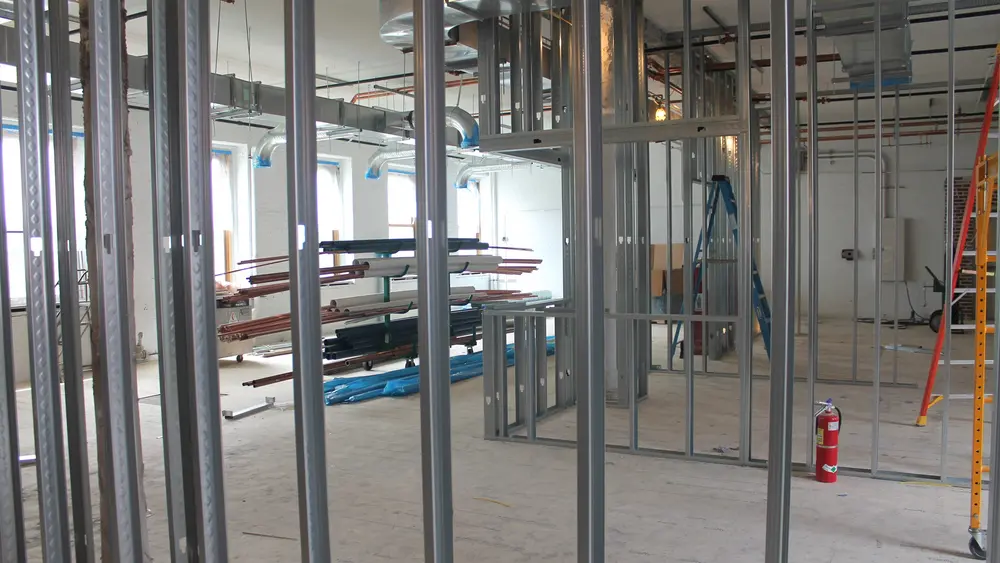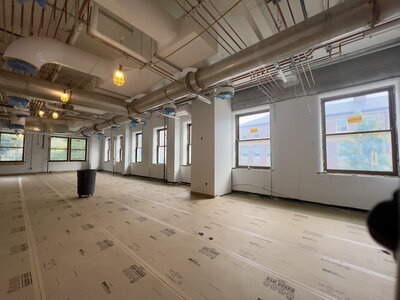
A major project launched in early 2024 features the renovation of a 6,000 square foot area on the second floor of Noyes Laboratory where the School of Chemical Sciences is leading the modernization of undergraduate labs, including advanced organic and inorganic lab facilities, equipment and curriculum to better prepare its students for successful careers in chemistry.
One half of this state-of-the-art facility will include an advanced organic synthesis lab for chemistry majors specializing in organic chemistry and an inorganic synthesis lab for chemistry majors and graduate students specializing in inorganic chemistry. The other half will house the Department of Chemical and Biomolecular Engineering’s Unit Operations Lab, a capstone course for ChBE undergraduate students.
The new facilities under construction in the chemistry portion of the project will not only meet up-to-date safety standards but will be more efficient and better equipped to provide students with high-tech experiential learning opportunities that prepare them for a successful career in chemistry.
An Illinois chemistry alum, Prof. Catherine Murphy (BS, '86) said she is always excited about ways to improve the undergraduate experience at Illinois and recalls being a student in one of the same courses that will be offered in this newly renovated space.
"I always loved being in the lab. I am excited that we will be able to offer brand-new, upgraded space for our chemistry majors for upper-level laboratory courses that involve both synthesis and analysis," Murphy said.
In addition to bringing in new equipment that is essential to a modern chemistry education, a planned instrument room with a glass wall will allow visitors and prospective students to observe state-of-the-art chemistry in action, providing a unique opportunity to improve undergraduate chemistry major recruiting. In addition, a new hallway will connect the east and west side of the building to improve accessibility (including ADA), routes of egress, and overall circulation in the building that accommodates thousands of students every day.
New experiments will be added to the courses that will be held in this space (CHEM 437 Organic Chemistry Lab, CHEM 317 Inorganic Chemistry Lab, and CHEM 517 Advanced Inorganic Chem Lab) that reflect the importance of modern topics such as asymmetric catalysis and organometallic mediated cross-coupling reactions. The department plans to increase the number of such experiments and introduce new analytical methods and spectroscopic tools used to monitor reactions and characterize both organic and inorganic compounds.
Josh Vura-Weis, associate professor of chemistry and associate head of major projects, has been overseeing the renovation project, and as a physical chemist, he helped design this instructional lab space.
“We really want to modernize both the layout of the lab and the experiments the students can do and use this as an opportunity to modernize the teaching that we are doing,” Vura-Weis said.
Most of chemistry’s half of the project features a large open-concept instructional lab with several large windows on the south-facing exterior wall of Noyes that allow in a lot of natural light where students will be doing their hands-on training. In this open design, students can see each other and communicate easily, but it is also conducive to safety, because the teaching assistants can see every student all at once as they do their lab work.

The infrastructure has been designed to enable a lot of flexibility in preparing for a wide variety of experiments. Tanks, for example, can easily be interchanged to supply a variety of specialty gases for a variety of reactions in hoods.
Thirteen hoods will be spaced along interior walls and three double glove boxes will be installed. And there will be a separate instrumentation room with a variety of modern instruments, like a bench top NMR, so students can do all the modern characterization of the products they make in the wet lab.
Vura-Weis said a big part of modern chemistry, especially inorganic synthesis, is now done in glove boxes.
“We see this as a way for the students to learn modern glove box techniques and to learn how to use them and make their reagents themselves and then they can still do some air free work in the hoods because that is still part of modern chemical synthesis,” he said.
The design of this instructional lab and the equipment that will be available to students allows the Department of Chemistry to weave more modern chemistry topics into the curriculum of these lab courses.
Vura-Weis said it is moving away from experiments people did 40 years ago and moving into more modern areas, like metal organic frameworks and asymmetric organo-catalyzed reactions. That type of reaction was part of the science awarded the Nobel Prize in chemistry in 2021.
“We have faculty who are designing new organic metal frameworks to do things like gas separations, so we are trying to connect the research that people do in the lab with the research that current faculty members are doing, and it also makes it much more relevant for our students,” Vura-Weis said.